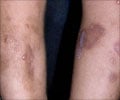Paternal grandfather's access to food is linked with mortality risk in grandson. Epigenetics is the reason behind this.
A large three generational study showed an association between paternal grandfather’s access to food during his childhood linked with mortality risk in his grandson, especially from cancer. Environmental exposures in one generation affect health outcomes in following generations.//
If a paternal grandfather had good access to food and experienced unusually high yields as a young boy, his grandson - but not granddaughter - has a higher mortality risk, the study shows. Especially high was the risk of cancer mortality. The researchers traced approximately 9,000 grandparents and examined the mortality of their grandchildren, more than 11,000 individuals. "Paternal grandfather's access to food predicts all-cause and cancer mortality in grandsons" is published in the journal
Nature Communications.
TOP INSIGHT
Epigenetics is the reason behind the correlation of paternal grandfather’s access to food and grandson’s mortality.
The results are very clear when it comes to the correlation between a grandfather's access to food and his grandson's mortality. A previous Swedish smaller study, the Overkalix study, showed the same result. However, we have been unable to determine other correlations over the generations, says Denny Vågerö, one of the authors of the paper and professor at the Department of Public Health Sciences, Stockholm University.
Previous research has suggested that the pre-pubertal, slow growth period (ages 9-12) is particularly vulnerable to nutritional effects. Denny Vågerö and colleagues' new study confirms this is true when it comes to men. However, there is no difference in mortality risk between grandsons who's paternal grandfather had low or average access to food.
Accounting for social factors, such as education, family size and income, the correlation between access to food and mortality in grandsons was enhanced.
The researchers do not claim to explain the causal relationship but believe that epigenetics might be the key.
Introduction of chemical pesticides was limited in the end of the 1800's and it's not likely that it would have led to new, large-scale mutations. Therefore, the most reasonable explanation would be that boys', but not girls', germ line cells are open for epigenetic change such as nutritional effects, during pre-puberty.
If that is the case, these changes might be passed on to following generations, something that is also shown in animal experiments. However, more research is needed, both in epidemiology and molecular biology, emphasises Denny Vågerö.
Source-Eurekalert

 MEDINDIA
MEDINDIA




 Email
Email










